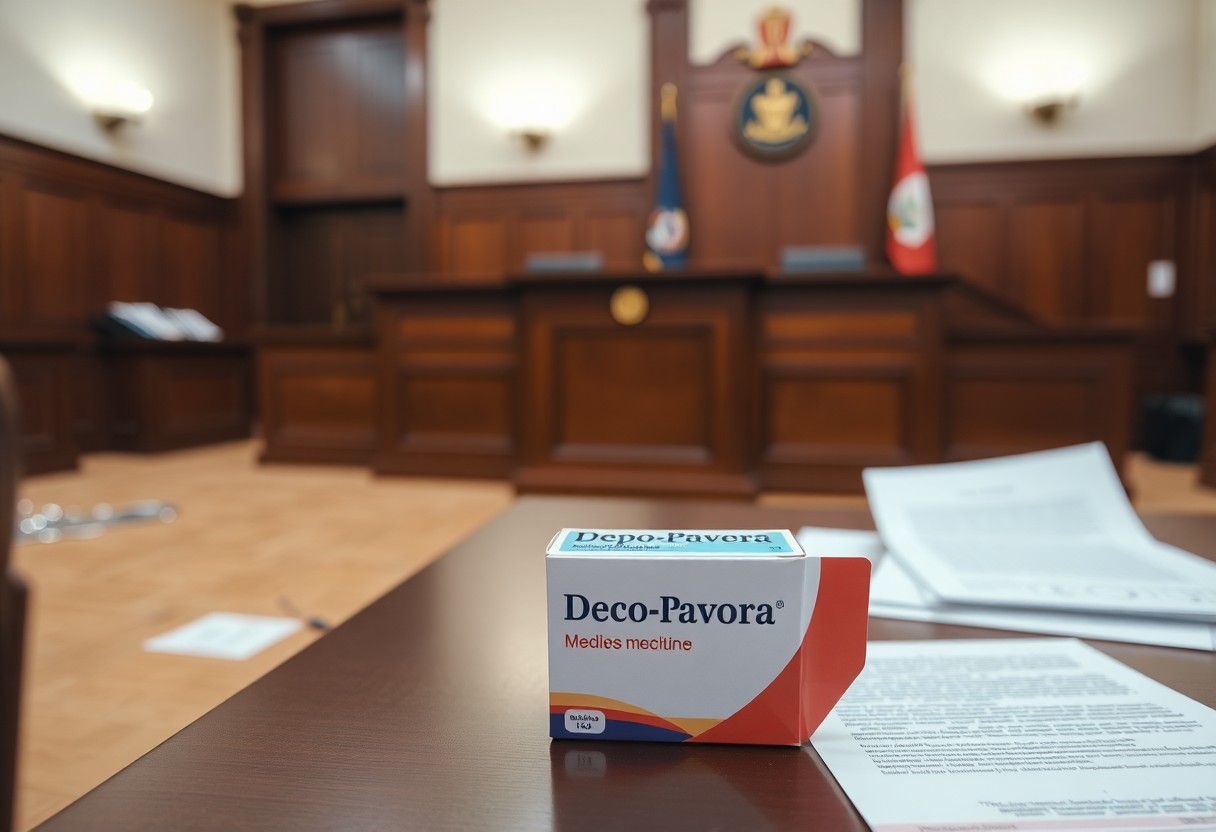Just as you seek to protect your health, it’s vital to hold pharmaceutical companies responsible for any harm caused by medications like Depo-Provera. This birth control method has been associated with serious side effects, and understanding how to take action can empower you to advocate for yourself and others. In this guide, you will learn the steps to document your experiences, report adverse effects, and engage with regulatory bodies to ensure accountability and support in addressing the concerns around Depo-Provera usage.
Understanding Depo-Provera
To fully grasp the implications of Depo-Provera, it is necessary to recognize its purpose and usage in reproductive health. This contraceptive injection, administered every three months, is designed to prevent pregnancy effectively. It works by inhibiting ovulation and creating a less favorable environment for fertilization. However, awareness of its benefits and risks is vital for informed healthcare decisions.
Overview of Depo-Provera
With its popularity as a long-acting contraceptive, Depo-Provera is utilized by many individuals seeking reliable birth control. The injection, which releases the hormone progestin, provides a convenient method that does not require daily action. While convenient, it is necessary to consider both its advantages and disadvantages when assessing your reproductive health options.
Known Risks and Side Effects
On the path to understanding Depo-Provera, acknowledging the risks and side effects associated with this contraceptive is critical. Some users may experience changes in menstrual bleeding patterns, weight gain, or mood swings. Additionally, long-term use might lead to decreased bone density and an increased risk of osteoporosis.
Understanding the known risks and side effects of Depo-Provera is necessary for your health and safety. Users often report irregular menstrual cycles, weight gain, and potential mood alterations. More seriously, prolonged use can lead to decreased bone density, heightening the risk of fractures and osteoporosis. It’s important to discuss these potential side effects with your healthcare provider to make an informed choice about whether this birth control method aligns with your health goals and lifestyle.
Legal Framework
Some individuals may be unaware of the extensive legal framework surrounding pharmaceutical companies like those producing Depo-Provera. Understanding the laws and regulations that govern drug approval and marketing is necessary for holding these companies accountable for any harm caused by their products. Legislations such as the Food, Drug, and Cosmetic Act ensure that medications deemed safe and effective undergo rigorous testing before they can enter the market, allowing you to better advocate for transparency and safety.
Regulatory Policies
If you are looking to hold pharmaceutical companies accountable, familiarize yourself with regulatory policies established by agencies like the FDA. These guidelines dictate the pre- and post-market surveillance of drugs and are designed to ensure public safety. Understanding these policies equips you with the knowledge to question compliance and safety practices from drug manufacturers.
Accountability Mechanisms
Accountability mechanisms play a vital role in overseeing pharmaceutical companies and ensuring adherence to safety standards.
This includes mechanisms like post-marketing surveillance, where the FDA monitors adverse reactions, and risk management plans mandated for certain drugs. In addition, whistleblower protections empower individuals within organizations to report unethical practices without fear of retaliation. By becoming knowledgeable about these mechanisms, you can advocate for stricter oversight and encourage pharmaceutical companies to maintain a high standard of care, ensuring that harmful medications like Depo-Provera are closely monitored for your safety.
Gathering Evidence
There’s a critical need to gather comprehensive evidence if you aim to hold pharmaceutical companies accountable for the harm caused by Depo-Provera. This process involves meticulous documentation and active participation from individuals affected, as well as consultation with medical professionals to substantiate the claims regarding adverse effects. Ensuring you have substantial evidence can significantly strengthen your case and lead to greater accountability for the manufacturers.
Documenting Medical History
An accurate and detailed medical history is imperative for validating your claims regarding Depo-Provera’s adverse effects. You should collect records of your prescriptions, details of any side effects experienced, and notes from healthcare providers that consider how the drug has impacted your health over time. This organized documentation will be instrumental in supporting your position.
Collecting Testimonies
While individual experiences may vary, gathering testimonies from others who have faced similar issues with Depo-Provera can amplify your case. You can create a collective voice that highlights the shared adverse effects and challenges faced by users of the drug.
Documenting testimonies from other users of Depo-Provera is a vital step in strengthening your argument. These narratives can provide insight into the specific challenges and health issues faced after using the product. You should encourage participants to share their experiences, detailing their symptoms, treatment journeys, and any interactions with healthcare providers about their issues. By compiling a diverse range of experiences, you create a comprehensive picture that demonstrates a broader pattern of harm caused by the drug, highlighting the need for accountability from pharmaceutical companies.
Engaging with Advocacy Groups
Unlike individuals acting alone, engaging with advocacy groups amplifies your voice and strength in holding pharmaceutical companies accountable for the harms caused by Depo-Provera. These organizations are necessary for raising awareness, providing resources, and mobilizing collective efforts toward accountability. By joining forces, you can significantly influence policy changes and foster community support to address the negative impacts of this contraceptive.
Finding Support Organizations
With numerous support organizations available, it’s vital to research and connect with those focused on reproductive health and women’s rights. These organizations provide vital information, advocacy resources, and connection to others who share your concerns, helping to create a stronger coalition for accountability.
Mobilizing Community Action
Any successful campaign to hold pharmaceutical companies accountable requires community engagement and action. By rallying your community and encouraging discussions about Depo-Provera, you can illuminate the risks associated with this contraceptive and mobilize collective action.
Action is necessary to drive change regarding Depo-Provera. Organize local events, create petitions, and utilize social media to spread awareness about the potential risks associated with this drug. Collaborating with others can foster a sense of community solidarity and amplify your message. You can educate others on their rights and the importance of speaking out, thus creating a ripple effect that can lead to significant pressure on pharmaceutical companies. It’s vital to inform your community about potential health risks and advocate for policy changes that prioritize women’s health and safety.
Filing Complaints and Legal Claims
Once again, you have a voice in holding pharmaceutical companies accountable for the harm caused by Depo-Provera. Filing complaints and legal claims is an vital step toward seeking justice and compensation for your experience. This not only brings awareness to the potential dangers of the drug but also pressures companies to rethink their practices and ensure safer options for consumers.
How to File a Complaint
To initiate a complaint, start by gathering all relevant documentation regarding your Depo-Provera usage and any health issues experienced. Submit your complaint to the appropriate regulatory body, such as the Food and Drug Administration (FDA), or consider reaching out to consumer advocacy groups that address pharmaceutical concerns. Be detailed in your account, as this can strengthen your case.
Understanding Legal Options
Clearly, exploring your legal options is vital when facing the effects of Depo-Provera. You may be eligible to join a class action lawsuit or pursue individual legal claims based on your specific situation. Consulting with an experienced attorney specializing in pharmaceutical litigation can help you understand your rights and navigate the complexities of the legal system.
Complaint processes can be overwhelming, which is why seeking legal assistance can be a wise choice. An attorney can assess the details of your experience and the extent of your injuries, allowing you to make informed decisions about the next steps. Depending on your case, you may be able to achieve a settlement or compensation for medical expenses and emotional distress. Working with professionals in the field can ensure you’re pursuing all possible avenues for justice and accountability.
Tips for Staying Informed
Your ability to hold pharmaceutical companies accountable for Depo-Provera harm greatly depends on your awareness of ongoing issues and advancements. Consider implementing the following strategies to stay informed:
- Subscribe to reputable health and pharmaceutical newsletters
- Follow advocacy organizations focused on women’s health
- Engage in online forums and discussions regarding Depo-Provera
- Attend seminars or webinars related to pharmaceutical accountability
Recognizing the importance of being informed empowers you to take action and advocate for your health.
Monitoring FDA Updates
The FDA plays a key role in regulating medications like Depo-Provera. Keep a close watch on their updates, as they often post valuable information regarding drug safety, efficacy, and any emerging concerns. Following their announcements can help you stay aware of potential risks and any changes to recommendations or usage guidelines.
Following Research Developments
You should actively seek out the latest studies and clinical trials focused on Depo-Provera and its impact. Academic journals, medical databases, and universities often publish this information as part of their ongoing research efforts.
Informed consumers who keep up with research developments benefit significantly from understanding both the risks and benefits of Depo-Provera. Emerging studies can highlight potential long-term side effects, inform users about alternative contraceptive options, and provide insights into how the drug affects different populations. Staying updated not only helps you make more educated decisions but also positions you to challenge any misleading claims made by pharmaceutical companies.
Final Words
Drawing together the steps outlined in this discussion, you can effectively hold pharmaceutical companies accountable for the harm caused by Depo-Provera. Staying informed about the drug’s risks, advocating for transparent communication, and supporting regulatory changes are vital actions you can take. Additionally, considering legal options and joining collective efforts can amplify your voice. By remaining engaged and proactive, you contribute to a safer healthcare environment and ensure that the rights of those impacted are respected and upheld.











